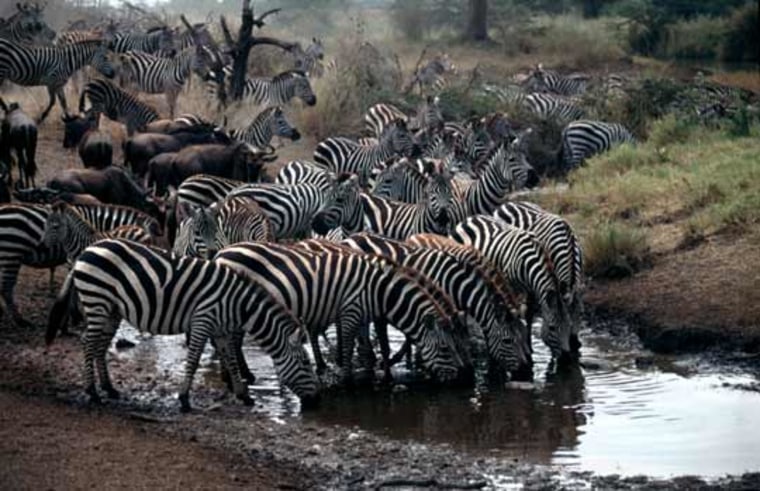Something in the water in Tanzania's Serengeti National Park is spurring the world's most spectacular migration, according to a new study.
Each year a legion of nearly two million wildebeest, zebras and gazelles circulate through the park, settling in the verdant grasslands to give birth while the rivers flow and new wet season grasses grow in endless abundance. Then, as if spooked, the herds suddenly begin to trek north in late May or early June, leaving behind an apparent paradise.
"When animals leave the south, there's still plenty of green forage," Ayron Strauch of Tufts University said. "And plenty of water."
Strauch and Frances Chew, also of Tufts, now think they know what sparks the exodus: an invisible, rising tide of salts in the rivers from which the herds drink.
Late in the wet season, the plains in the southern part of the park appear healthy and full of nutritious food, but the rain has already begun to slacken. When Strauch and Chew sampled water from the Mbalageti and Seronera rivers in the region, they found that concentrations of calcium, sodium and potassium salts soared to levels that could be dangerous to the animals' health.
"These nutrients are vital to life on the plains, to be sure," Strauch said. "But as base flow in the rivers decreases, concentrations of these nutrients skyrocket to hundreds of times what animals might encounter in the plants they eat."
Strauch will present the research next month at the annual meeting of the Ecological Society of America.
Studies of farm animals have shown that elevated salts in the water supply can cause cardiovascular disease and kidney failure in adults and cripple females' ability to lactate. New-born animals that drink tainted water can suffer from impaired bone and nerve development, and have trouble gaining weight.
"Basically as soon as the water starts turning brackish, you start to see adverse effects," Strauch said.
The same may hold true for Serengeti's wild herds. Strauch and Chew reason that the spike in salt content in the southern waters acts as a signal that its time to move north, before the harsh dry season sets in and food sources begin dwindling.
However, John Fryxall of the University of Guelph in Canada said declining nutrients in grasses may drive migration, rather than water quality.
"These animals need the green flush of nutrients in early growth-stage grasses," he said. Grasses growing late in the wet season are too long and full of woody material that animals can't digest.
In addition, animals also have to compete with humans living nearby for water. Villages surrounding the park are swelling, thanks in part to tourism generated by the famous wildlife. Local inhabitants are increasingly diverting river water for irrigation and drinking.
"There is increasing demand for a finite water resource," Fryxall said. "Future changes in water quality will be important to pay attention to; worsening quality could impose additional mortality on the animals."
More on Serengeti National Park | animal migration
